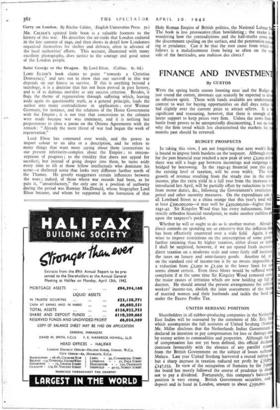Saint George or the Dragon. By Lord Elton. (Collins. 8s.
6d.) LORD ELTON'S book claims to point "towards a Christian Democracy," and sets out to show that our survival in this war depends on our fitness to survive. If this is anything beyond a tautology, it is a doctrine that has not been proved in past history, and is of as dubious morality as any success criterion. Besides, it flogs the theme of regeneration through suffering which, leaving aside again its questionable truth, as a general principle, leads the author into many contradictions in application ; over Weimar Germany, for instance, and the relations of the Home Government with the Empire ; it is not true that concessions to the colonies were made because war was imminent, and it is nothing but preposterous to close a paean on the Ottawa Agreements with the remark : "Already the mere threat of war had begun the work of regeneration."
Lord Elton has command over words, and the power to impart colour to an idea or a description, and he refers to many things that want more saying about them (correctives to our present inferiority-complex about the Empire ; to miscon- ceptions of progress ; to the timidity that dares not appeal for sacrifice), but instead of going deeper into them, he turns aside every time to tilt at those fellow intellectuals who dominate his scene—a sheltered scene that looks very different further north of the Thames. He greatly exaggerates certain influences between the wars ; indeed, of those whose war records had been, as he puts it, "unsatisfactory," the only one in a position of authority during the period was Ramsay MacDonald, whose biographer Lord Elton became, and whom he supported in the formation of that
Holy Roman Empire of British politics the National Labour p The book is less provocative /than bewildering; the reader is wondering how the contradictions and the half-truths come a the discernment spoiling on the surface, and the penetration cous ing in petulance. Can it be that the root cause from which It follows is a maladjustment from being so often on the s; side of the barricades, une trahison des clercs ?


























 Previous page
Previous page